Disclosure: Meeple Mountain received a free copy of this product in exchange for an honest, unbiased review. This review is not intended to be an endorsement.
My wife, ever the gaming critic herself, watched as I set up our first play of the game Crown of Emara, designed by Benjamin Schwer (Hadara) and published by Pegasus Spiele.
“Have we played this game before?” she began.
“We have not!” I answered. “This game did come out a few years ago, but we haven’t played it before.”
“Are you sure? I mean, look at these wood resource pieces; these look like that other game we have, right?”
I paused. I was sure we hadn’t played Crown of Emara before, but I had to admit: all the pieces looked like they were from lots of other games. Stone? Yep. Wood? Of course? Cloth? In this game, they were blue, but there were definitely cloth pieces. Wheat? Certainly. Even a wooden token that looked a hell of a lot like the town pieces in Catan is used here to keep track of one of your score tracks.
We also had cardboard book chits. Gold coins. Resource trackers. Signet rings. The artwork? Dry as a dry Euro can be.
“Which of the Caucasian male characters would you like to be this time?” I offered. Your available choices included young-ish royalty types, all white men, with red, blue, yellow and green sashes around their respective necks.
Crown of Emara, then, is almost shockingly akin to every single other midweight Euro game in the history of board games. I could see my wife beginning to fall asleep as I quickly made my way through a 10-minute teach. All the signs were there: this is gonna fall flat.
But then we started playing. Crown of Emara won’t (and didn’t) win any awards for nearly any aspect of the design, production, and gameplay elements featured here. However, it’s a slick 45-minute experience thanks to one simple mechanism that elevates it above “meh.”
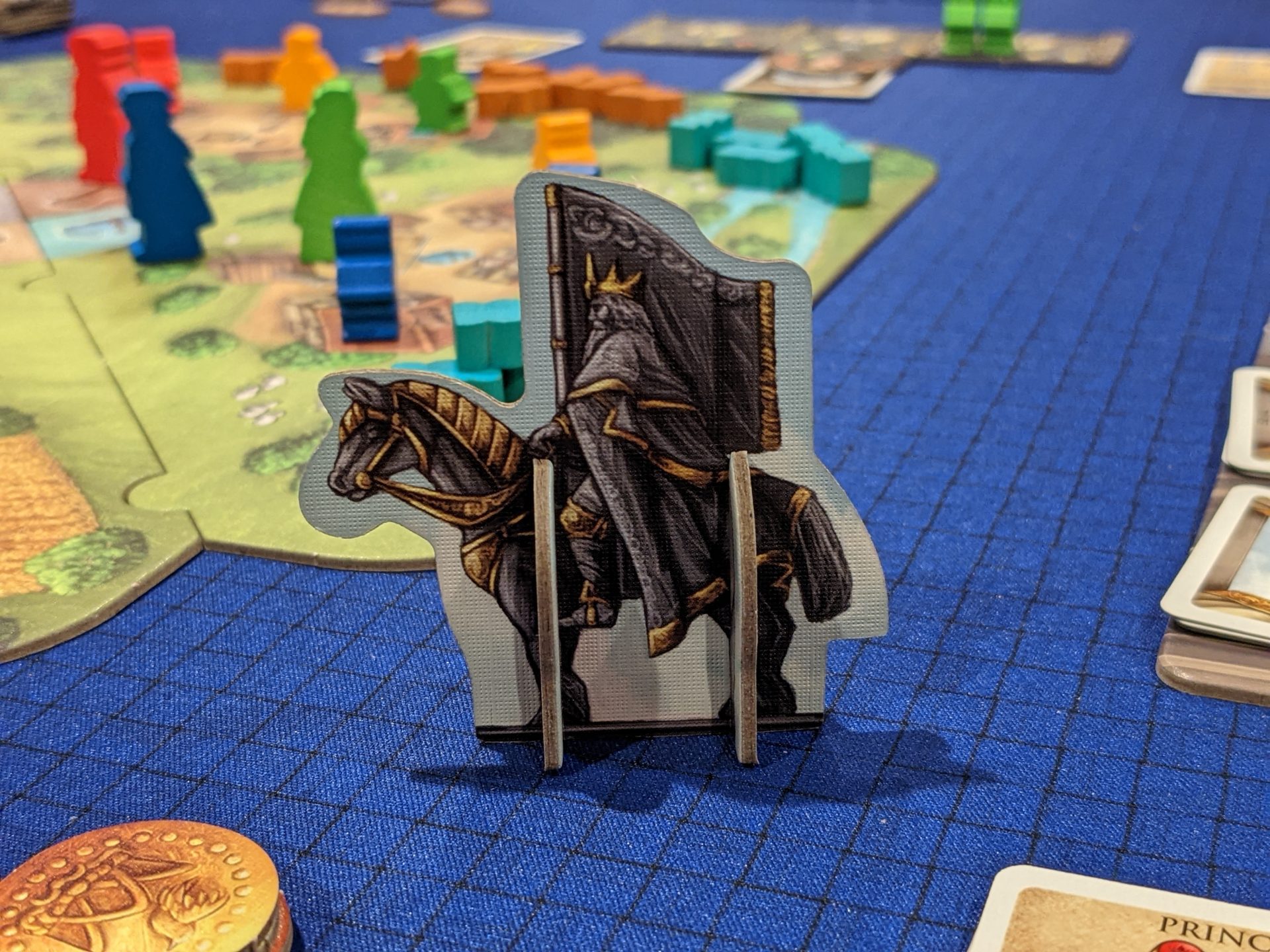
Oh, That’s Good!
Crown of Emara keeps things simple, and I would argue you could play this with your “Muggle” friends, the term my gamer friends level on those who don’t like to nerd out with 30-page rulebooks on weekends like I do.
You’ve got 2 game boards: one representing the countryside, and one representing the town. With each board, you have four spaces, and there is one Councilor of each player’s color on each board. In the country, you can gather resources: stone, wheat, wood, cloth. In town, you can spend resources to do stuff: get gold coins, get Signet Rings, get books and Favor tiles, spend resources to get either victory points or building points.
Ahh, yes; scoring. In Crown of Emara, you’ve got 2 score markers: one to track Citizen Points, because the people in the lands of Emara want to be happy. The other score marker tracks Building Points, because ultimately all these greedy citizens want is somewhere to lay their heads down at night. At the end of the game, each player’s score is the LOWER of these two trackers. So, keeping both of them high is vital to success.
Each player has a player board with 3 card slots: a number of steps you can move your Councilor clockwise around the spaces of the 2 game boards. Each player also has a set of the same 9 cards; in each of the 6 game rounds, you’ll only have 3 cards drawn at random from your personal deck to determine which actions you want to take, and in which action slots those cards will go. (At the end of round 3, all of your discards are shuffled then used again for the final 3 rounds.)
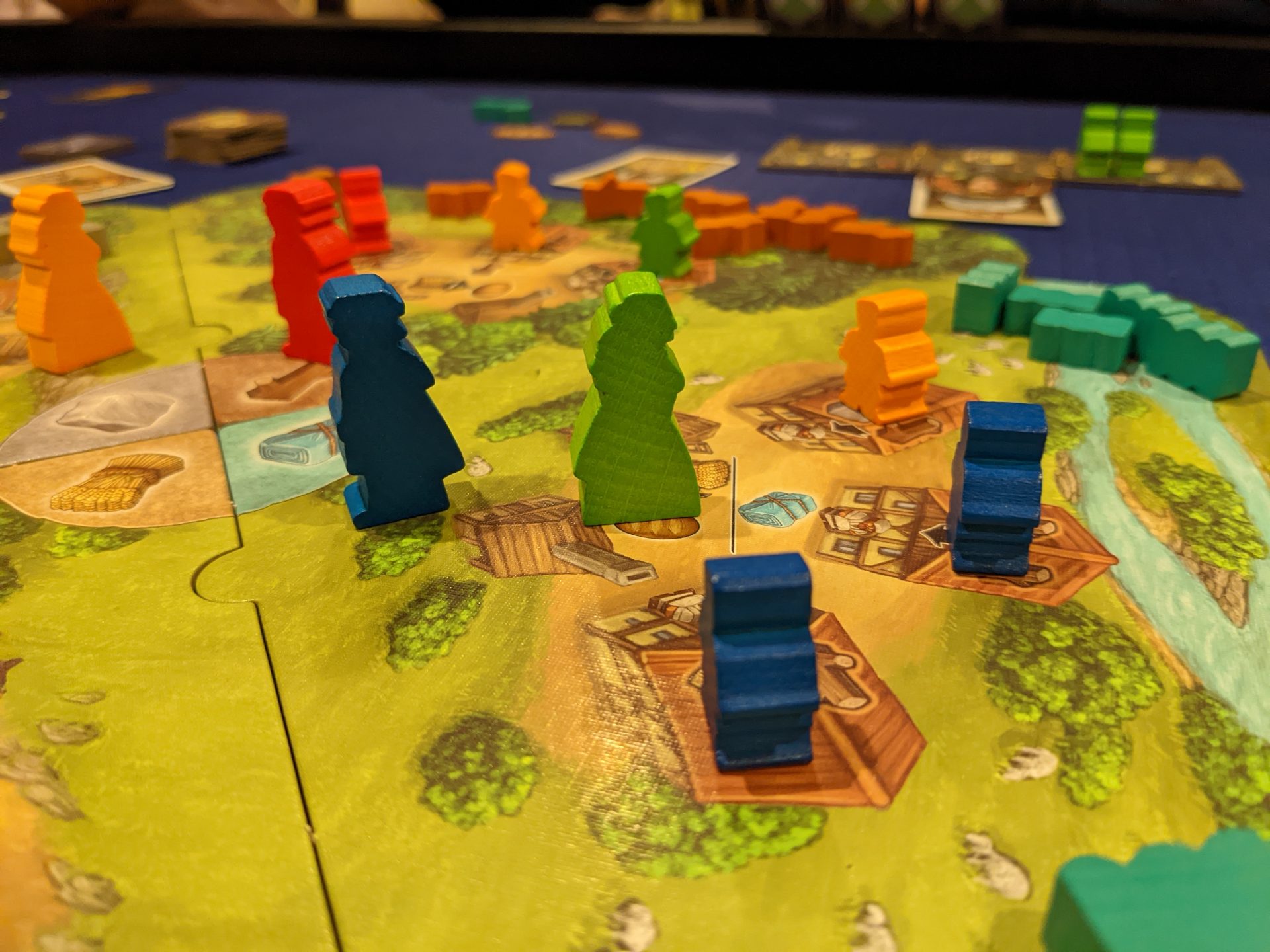
So, you’ve got a little to think about every turn. First, which of my Councilors do I want to move? Then, which of the 3 cards in my hand do I want to play? Then, which slot do I want to play the card into, dictating how many steps my chosen Councilor will take?
Random event cards—minor, in the grand scheme of things—also appear at the start of each round; some grant a small bonus, some change the scoring rules for that round, etc. But for the most part, there are no real elements of chance built into the design; Euro game basics at their finest.
One other thing: each of your 9 cards provides something to the player. 5 of them simply give you stuff: one of the 4 resources, or a Signet Ring. The rest make a certain action slightly more efficient or just cheaper: maybe getting 2 coins instead of only 1. Or maybe you can move one of your Councilors one space around its track, before or after your main card slot action and maybe not even the same Councilor!
Oh, that’s good!
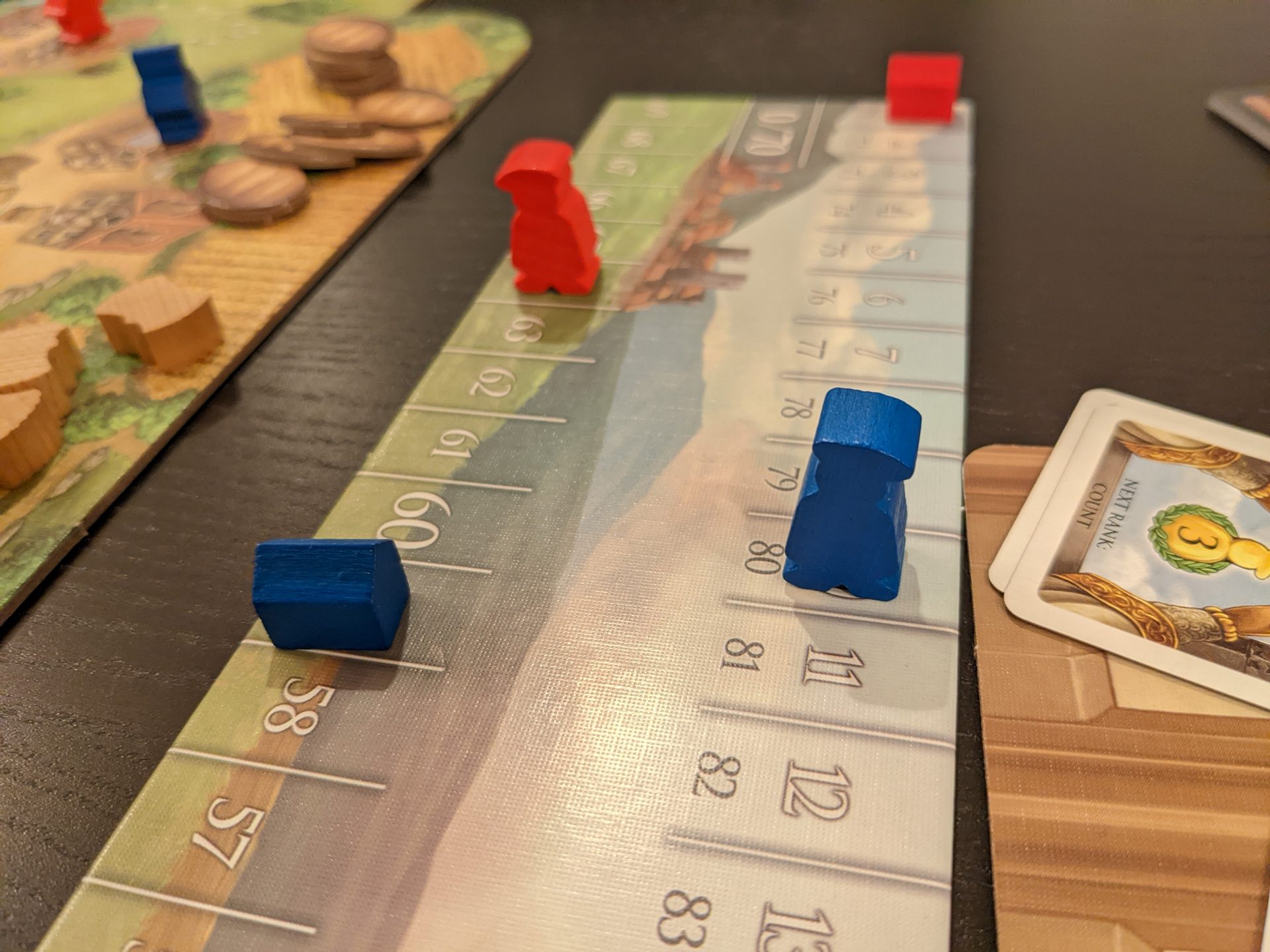
And then you’ve got access to some bonus actions. Crown of Emara is a game about rising in nobility, so of course there’s a bonus action where you can spend those hard-earned Signet Rings and coins to advance in rank, scoring extra Citizen points. Every town location has Advisor cards, which can be bought with some of those resources you’ve been collecting in the countryside. Each of these cards score points on one of the tracks, and might give you a one-time or ongoing bonus on top of that.
You could also spike production in the countryside by spending resources to add Craftsmen to spaces in each of the 4 spaces there. This scores even more points and provides an additional resource for every Craftsman in that location.
You’ll score points for doing almost everything in Crown of Emara, but the player that can do it most efficiently is going to win. This will also provide chances for a couple of whoppers every game: I’m still angry about the turn my wife pulled off in our first game when she scored 35 points on her last turn such that both of her score tracks pulled ahead of my lower, Building score marker to claim the victory.
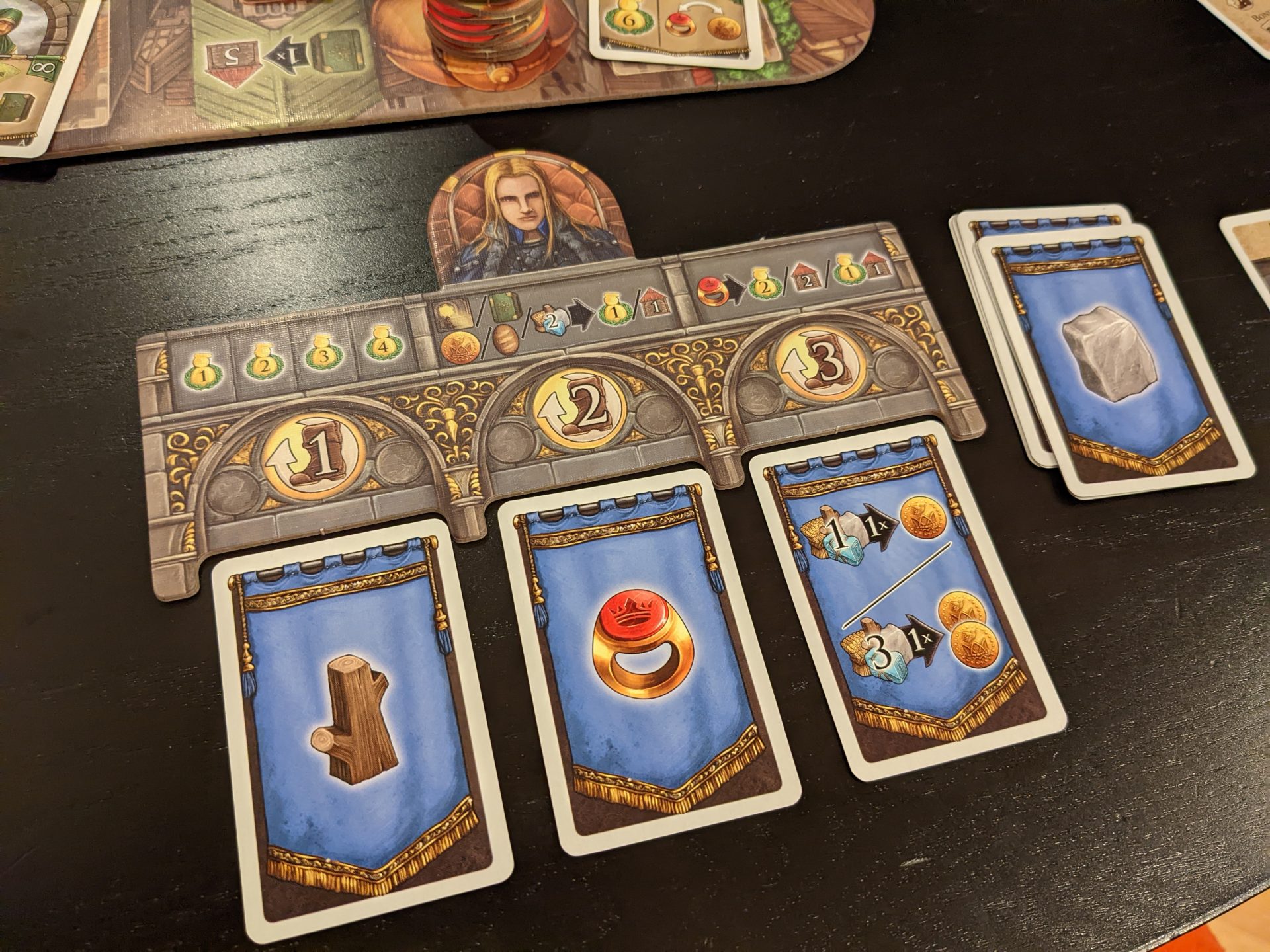
“They Are Who We Thought They Were”
Crown of Emara might shine brightest for a gamer who has never really invested time in games like Orléans, Lorenzo Il Magnifico, Catan, Grand Austria Hotel or any Euro game where your job is to gather resources to spend on better cards. If the sheen of the game is original to you, this type of gameplay will feel fresh and exciting.
For most core gamers, or those who have been around the block in this hobby for many years, Crown of Emara is a tougher recommendation. While I enjoy how the cardplay mechanic slightly separates the experience from many other games, there is nothing about the theme, the scoring, the production, and the core gameplay elements will make a player say “I would play Crown of Emara over [insert any classic midweight Euros released in the last 15 years].”
Crown of Emara is good. It’s fun to think through how to max your turn to score the most points while setting up future turns. I have had a couple of fist pump turns every time I’ve played it, and even when I’m losing, setting up turns can be quite satisfying. The game is almost exclusively against player interaction, which means that the solo mode is a great way to practice. (I played it 4 times to prepare for multiplayer games, and on one occasion, I played 2 solo games back-to-back in less than 30 minutes.)
However, in a crowded category, with years of great games to fall back on, Crown of Emara will never win out when I can call upon games like the ones mentioned earlier. Crown of Emara is fun, but ultimately not on the list of my all-time favorite Euro experiences.


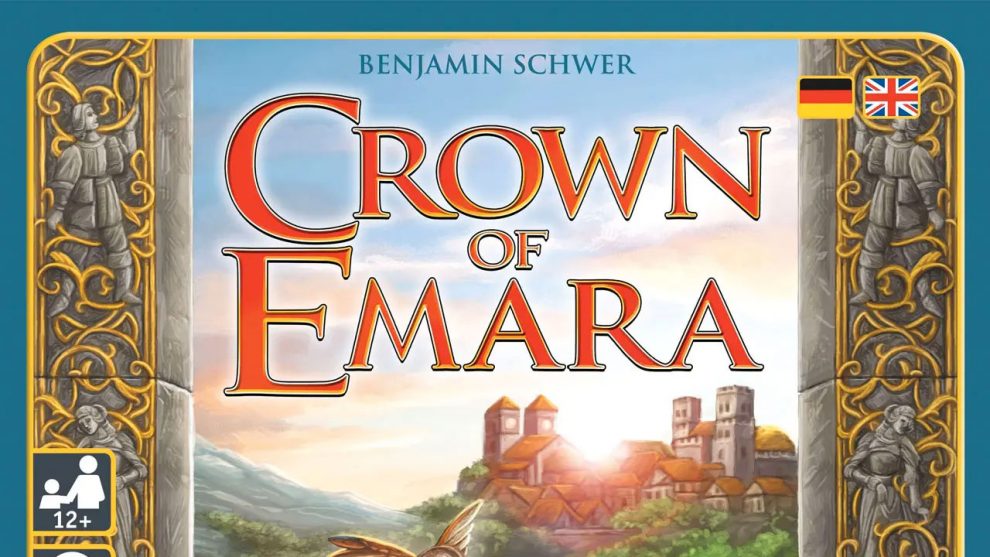









Funny how your reviews are always positive when they give you free stuff
Since you didn’t provide your actual name or email address, you’ll never see a notification of this reply, but perhaps someone else will and realize that’s not true.
Non-glowing reviews, based off provided media copies.
Redsky: The Board Game – 1.5 stars
Cool Cool Cool – 1.5 stars
Talisman – 5th Edition – 2.5 stars
Pyramidice – 2 stars
Hamlet – 2.5 stars
And that’s just within the past 1.5 months.
I have no idea what you (Anonymous OP) are talking about. The reviews I have written (for example) for games I have review copies for have been negative enough that the publisher actually got rather nasty with Andy for publishing it.
The games I have received review copies of have gotten:
– 0.5 – Paper App Dungeon
– 1.5 – Prosperitea; Redsky
– 2.5 – Hedge Mage (this is the one that ticked off the publisher)
– 4.0 – Fantasy Map Maker; Logic & Lore
– 4.5 – Four Gardens; Wingspan Asia
My average for review copies is 2.875 — not exactly ‘glowing’ now, is it?
I have been writing for Meeple Mountain for a little less than a year now. I have seen how each and every reviewer on this site struggles as they try to find their voice while expressing an honest (often very critical) view of a game whether they received this as a review copy or they purchased the game themselves. All of the writers on this site are very good people doing the best they can.
The next line in this comment is not from K. David Ladage, reviewer on Meeple Mountain — it is from K. David Ladage, fan of Meeple Mountain:
Perhaps taking a moment and getting your facts straight before you anonymously make accusations of very good people trying to do you a service would be best.